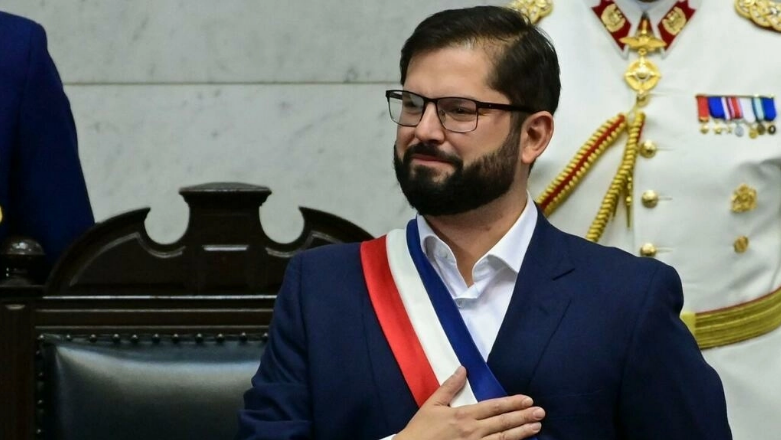Gabriel Boric was officially sworn in as President of Chile on March 11, 2022
At the head of a government composed mainly of women, leaving ample room for independent political figures, Gabriel Boric became Friday, at 36, the youngest president in the history of Chile. He now has four years to fulfill his campaign promises of a more protective state in a very unequal country. He carries on his shoulders the weight of the anger of the social movement of 2019 and embodies the hope of a new, more egalitarian economic model: Gabriel Boric, 36, assumed, on Friday, March 11, a delicate transfer of power in Chile, the most scrutinized since the return of democracy in 1990.
In a Chile “cradle of neoliberalism in Latin America”, the new president, elected in December against the far right at the head of a left-wing coalition including the Communist Party, promised that it will also be “his tomb”.

This former president of the Federation of University of Chile Students (FECH) dreams of setting up a welfare state to help the indebted middle classes and to lift Chile from the bottom of the ranking of most of the Organization for Economic Co-operation and Development (OECD).
He promised a major tax reform to involve the richest in his program of better access to health, education, and the creation of a new pension system, now entirely private.
But his desire for sweeping changes to Chile’s neoliberal economic model will be met with near-zero growth by 2023 and a parliament that is not entirely on his side, even if it pledges “more than social rights while remaining fiscally responsible”.
A majority-female government
To carry out his plan forged on the benches of the faculty of law and at the head of the student demonstrations of 2011 “for a free and quality education”, Gabriel Boric surrounded himself with his faithful companions in struggle: Camila Vallejo, 33, the new government spokesperson, and Giorgio Jackson, 35, appointed Minister for Relations with Parliament.

Its 42-year-old government, mostly female (14 women out of 24 ministers), has a third of independents, including the key Minister of Economy and Finance, the respected former President of the Central Bank Mario Marcel, 62 years old. The announcement of his appointment reassured the markets which had plummeted the day after the presidential election.
The sovereign positions of Justice, Interior, and Defense will all be headed by women.
The symbolic significance of the appointment to Defense of Maya Fernandez, 50, granddaughter of former socialist president Salvador Allende (1970-1973) overthrown by General Pinochet, is immense. She intends to close a little more the years of dictatorship reinvigorated by the accession to the second round of José Antonio Kast, openly admirer of Pinochet.
A former domestic worker turned trade unionist, Luz Vidal, 48, will be the new deputy minister for women and gender equality, an equally symbolic appointment in a country marked by social inequality where 1% of Chileans own 25 % of the wealth, according to a UN agency.
Limited Political Experience
This crowning achievement of a generational change in Chilean politics, Gabriel Boric says he wanted it by composing a “team of ministers led by people of diverse origins and backgrounds, a government with a majority of women (…) , intergenerational, with a plurality of politics and points of view”.

The realization of its program could be facilitated by the arrival of a new Constitution if it is validated by referendum. Currently being drafted by an elected Constituent Assembly, it is to replace that drawn up under the dictatorship of Augusto Pinochet (1973-1990). It was one of the main demands of the social uprising of 2019, of which Gabriel Boric is today the political heir and whose expectations he must now meet. Other challenges await the “green government” that Gabriel Boric announced in mid-January to an audience of business leaders. Issues of public safety, illegal migration, and tensions with indigenous communities have dragged on for more than a decade and, for the most part, have worsened.
Themes that can paralyze the dynamic on which this beginning of the term of office is based under the sign of the hope aroused by the youth of Gabriel Boric, tempered however by his limited political experience. Because the former trade unionist only served two terms as a deputy, between 2013 and 2021.






